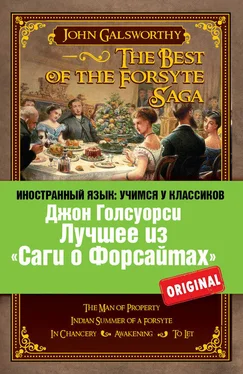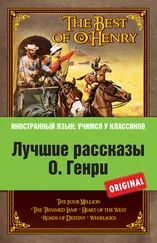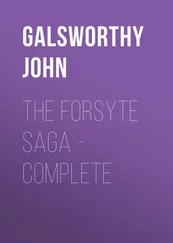The two rows of seats immediately in front of James were gradually filled by barristers in wigs, who sat down to make pencil notes, chat, and attend to their teeth; but his interest was soon diverted from these lesser lights of justice by the entrance of Waterbuck, Q.C., with the wings of his silk gown rustling, and his red, capable face supported by two short, brown whiskers. The famous Q.C. looked, as James freely admitted, the very picture of a man who could heckle a witness.
For all his experience, it so happened that he had never seen Waterbuck, Q.C., before, and, like many Forsytes in the lower branch of the profession, he had an extreme admiration for a good cross-examiner. The long, lugubrious folds in his cheeks relaxed somewhat after seeing him, especially as he now perceived that Soames alone was represented by silk. [44]
Waterbuck, Q.C., had barely screwed round on his elbow to chat with his Junior before Mr. Justice Bentham himself appeared – a thin, rather hen-like man, with a little stoop, clean-shaven under his snowy wig. Like all the rest of the court, Waterbuck rose, and remained on his feet until the judge was seated. James rose but slightly; he was already comfortable, and had no opinion of Bentham, having sat next but one to him at dinner twice at the Bumley Tomms’. Bumley Tomm was rather a poor thing, though he had been so successful. James himself had given him his first brief. He was excited, too, for he had just found out that Bosinney was not in court.
‘Now, what’s he mean by that?’ he kept on thinking.
The case having been called on, Waterbuck, Q.C., pushing back his papers, hitched his gown on his shoulder, and, with a semi-circular look around him, like a man who is going to bat, arose and addressed the Court.
The facts, he said, were not in dispute, and all that his Lordship would be asked was to interpret the correspondence which had taken place between his client and the defendant, an architect, with reference to the decoration of a house. He would, however, submit that this correspondence could only mean one very plain thing. After briefly reciting the history of the house at Robin Hill, which he described as a mansion, and the actual facts of expenditure, he went on as follows:
“My client, Mr. Soames Forsyte, is a gentleman, a man of property, who would be the last to dispute any legitimate claim that might be made against him, but he has met with such treatment from his architect in the matter of this house, over which he has, as your lordship has heard, already spent some twelve – some twelve thousand pounds, a sum considerably in advance of the amount he had originally contemplated, that as a matter of principle – and this I cannot too strongly emphasize – as a matter of principle, and in the interests of others, he has felt himself compelled to bring this action. The point put forward in defence by the architect I will suggest to your lordship is not worthy of a moment’s serious consideration.” He then read the correspondence.
His client, “a man of recognised position,” was prepared to go into the box, and to swear that he never did authorize, that it was never in his mind to authorize, the expenditure of any money beyond the extreme limit of twelve thousand and fifty pounds, which he had clearly fixed; and not further to waste the time of the court, he would at once call Mr. Forsyte.
Soames then went into the box. His whole appearance was striking in its composure. His face, just supercilious enough, pale and clean-shaven, with a little line between the eyes, and compressed lips; his dress in unostentatious order, one hand neatly gloved, the other bare. He answered the questions put to him in a somewhat low, but distinct voice. His evidence under cross-examination savoured of taciturnity.
Had he not used the expression, “a free hand”? No.
“Come, come!”
The expression he had used was ‘a free hand in the terms of this correspondence.’
“Would you tell the Court that that was English?”
“Yes!”
“What do you say it means?”
“What it says!”
“Are you prepared to deny that it is a contradiction in terms?”
“Yes.”
“You are not an Irishman?”
“No.”
“Are you a well-educated man?”
“Yes.”
“And yet you persist in that statement?”
“Yes.”
Throughout this and much more cross-examination, which turned again and again around the ‘nice point,’ James sat with his hand behind his ear, his eyes fixed upon his son.
He was proud of him! He could not but feel that in similar circumstances he himself would have been tempted to enlarge his replies, but his instinct told him that this taciturnity was the very thing. He sighed with relief, however, when Soames, slowly turning, and without any change of expression, descended from the box.
When it came to the turn of Bosinney’s Counsel to address the Judge, James redoubled his attention, and he searched the Court again and again to see if Bosinney were not somewhere concealed.
Young Chankery began nervously; he was placed by Bosinney’s absence in an awkward position. He therefore did his best to turn that absence to account.
He could not but fear – he said – that his client had met with an accident. He had fully expected him there to give evidence; they had sent round that morning both to Mr. Bosinney’s office and to his rooms (though he knew they were one and the same, he thought it was as well not to say so), but it was not known where he was, and this he considered to be ominous, knowing how anxious Mr. Bosinney had been to give his evidence. He had not, however, been instructed to apply for an adjournment, and in default of such instruction he conceived it his duty to go on. The plea on which he somewhat confidently relied, and which his client, had he not unfortunately been prevented in some way from attending, would have supported by his evidence, was that such an expression as a ‘free hand’ could not be limited, fettered, and rendered unmeaning, by any verbiage which might follow it. He would go further and say that the correspondence showed that whatever he might have said in his evidence, Mr. Forsyte had in fact never contemplated repudiating liability on any of the work ordered or executed by his architect. The defendant had certainly never contemplated such a contingency, or, as was demonstrated by his letters, he would never have proceeded with the work – a work of extreme delicacy, carried out with great care and efficiency, to meet and satisfy the fastidious taste of a connoisseur, a rich man, a man of property. He felt strongly on this point, and feeling strongly he used, perhaps, rather strong words when he said that this action was of a most unjustifiable, unexpected, indeed – unprecedented character. If his Lordship had had the opportunity that he himself had made it his duty to take, to go over this very fine house and see the great delicacy and beauty of the decorations executed by his client – an artist in his most honourable profession – he felt convinced that not for one moment would his Lordship tolerate this, he would use no stronger word than daring attempt to evade legitimate responsibility.
Taking the text of Soames’ letters, he lightly touched on ‘Boileau v. The Blasted Cement Company, Limited.’ “It is doubtful,” he said, “what that authority has decided; in any case I would submit that it is just as much in my favour as in my friend’s.” He then argued the ‘nice point’ closely. With all due deference he submitted that Mr. Forsyte’s expression nullified itself. His client not being a rich man, the matter was a serious one for him; he was a very talented architect, whose professional reputation was undoubtedly somewhat at stake. He concluded with a perhaps too personal appeal to the Judge, as a lover of the arts, to show himself the protector of artists, from what was occasionally – he said occasionally – the too iron hand of capital. “What,” he said, “will be the position of the artistic professions, if men of property like this Mr. Forsyte refuse, and are allowed to refuse, to carry out the obligations of the commissions which they have given.” He would now call his client, in case he should at the last moment have found himself able to be present.
Читать дальше
Конец ознакомительного отрывка
Купить книгу

![Автор неизвестен Эпосы, мифы, легенды и сказания - Самые лучшие английские легенды [The Best English Legends]](/books/34729/avtor-neizvesten-eposy-mify-legendy-i-skazaniya-s-thumb.webp)










